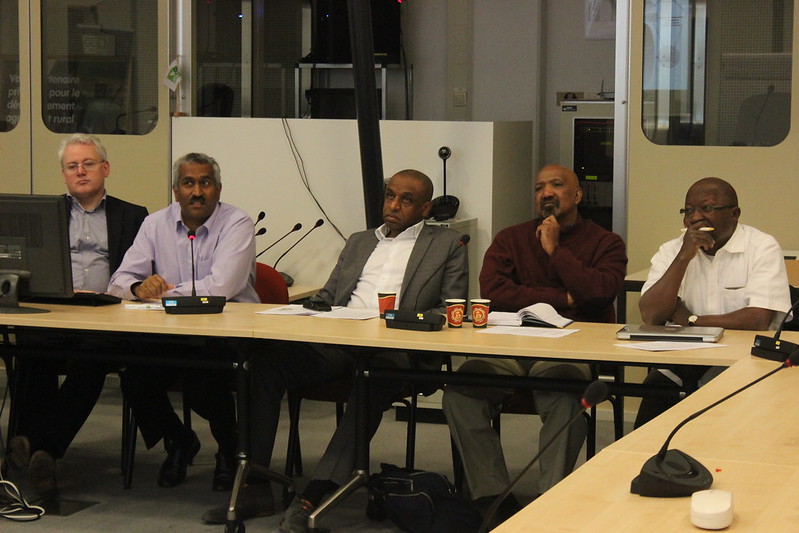25th January 2016. Roundtable of aflatoxin experts on “Building a multi-stakeholder approach to mitigate aflatoxin contamination of food and feed”.

PAEPARD organized with the support of the Directorate General Santé of the European Commission and the East African Farmer Federation (EAFF), and in collaboration with the Partnership for Aflatoxin Control in Africa (PACA) and the African Society of Mycotoxicology (ASM), a roundtable meeting of key aflatoxin experts (not only research experts) on
the mitigation of aflatoxin in food and feed in Africa on Monday 25/01/2015 in Brussels (
by invitation only).
SEE THE FULL REPORT OF THIS MEETING:
Strategies to mitigate aflatoxin final250316.pdf
Some
40 experts participated in this meeting originating from (in alphabetic order: Austria, Belgium, Benin, Denmark, Egypt, Ethiopia, France,
Germany, Italy, Ivory Coast, Kenya, Malawi, Mali, Nigeria, Nigeria, Norway, Serbia,
South Africa, Sweden, Switzerland, the Netherlands, United Kingdom , United
States, Zimbabwe). The meeting involved private sector actors, non-governmental organisations, research institutes and EC policy makers (DG Sante and DG Agriculture).
The video-on-demand will be available via the same link for 2 years (after which it will be automatically deleted).
400 persons followed the web stream. Average watching time 24:21
https://scic.ec.europa.eu/streaming/management-of-aflatoxins-in-africa-working-group-implementing-legislation
The pictures of the meeting are available here
The Round Table was a follow up to the PAEPARD policy brief on the aflatoxin contamination of food and feed in Africa presented during
the DEVCo Info Lunch conference in Brussels on 26th October 2015.

- Date: Monday 25th January 2016: 9h30-17h30
- Venue: Albert Borschette Conference Center
(36 rue Froissart, Metro station “Schuman” lines 1 and 5)
- Meeting Room: 5b
- Meeting title: Management of Aflatoxin in Africa: working group on aflatoxin
- Organiser: PAEPARD
The objectives of the Roundtable meeting were:
- Assessing the real needs of Africa, expressed by various stakeholders.
- Assessing the current expertise from African and European organisations on aflatoxin issues
relevant to Africa, and identify new research and ICT (Information and communication technology) collaboration on aflatoxin mitigation between Africa and Europe and synergies with ongoing or future aflatoxin research in Africa (China, USA, Germany …). 1
- Linking together the most competent partners around the funding and knowledge bases for implementing aflatoxin contamination mitigation on a large scale in Africa.
The format of this meeting included a morning session with presentations and discussions. The afternoon session will be organized in three consecutive panels on pre-harvest mitigation, post-harvest technologies, and education and awareness creation. The third and last session will discuss upcoming funding opportunities and an action plan for the way forward.
9:30 Welcoming by DG Sante
Frans Verstraete
Welcoming by PAEPARD and EAFF
Stephen Muchiri, EAFF, the Chairperson of
the morning session
Remi Kahane, PAEPARD
Keynote speaker
Comments
on the PAEPARD policy note: "The role of multi-stakeholder partnerships
between Africa and Europe exemplified by the issue of aflatoxin contamination
of food and feed"
Dr. Habiba Wassef, Bio-NCP Egypt (H2020 National Contact Point), nutritionist and
senior reviewer FP5, FP6, FP7 and Horizon 2020.
Amare Ayelew , Program Manager, Addis Ababa,
Ethiopia.
 10:30 Improving Food Safety in Africa
10:30 Improving Food Safety in Africa
Brad Flett - Agricultural
Research Council - Grain Crops Institute, Potchefstroom, Republic of South Africa. President of the African Society of Mycotoxicology
Antonio Logrieco, Istituto Scienze delle Produzioni
Alimentari (ISPA), Bari, Italy
(coordinator of the Mycokey project under H2020-
SFS-13-2015 call on Biological contamination of crops and the food chain: A
contribution to a long-term collaboration with China on food safety).
Andrew Emmott, Twin&Twin Trading, Senior Associate
(Nuts), London, UK.
12:00 Respondents:
Below experts will react to the presentations in a panel discussion. The
PPTs
below will not be presented but serve as background for the participants
12:30 – 14:00 Lunch break and
networking (self-service cafeteria, same floor of the building)
Session 2: Actions
14:00 Chair person: Lynn
Brown (Global Donor Platform for Rural Development)
Panel discussions: Presentations in
3 consecutive panels (pitching type of panel without slide show).
14:15 Panel
discussion on pre-harvest mitigation:
15:00 Panel
discussion on post-harvest
technologies:
15:45 Panel
discussion on Education and awareness creation:
Kouadio James (University Félix Houphouet-Boigny,
Abidjan - Côte d’Ivoire) Toxicologie et hygiène
alimentaire (title tbc)
Daniel Gad (Exporter and entrepreneur in horticulture
- Ethiopia) The importance of consumer
awareness on the risks of aflatoxin contamination
Session 3: Funding
16:30 Panel discussion on Funding opportunities:
Marc
Duponcel (DG Agriculture H5) H2020
priority setting, themes and the current selection process (cfr. multi
stakeholder consortia)
17:00 Recommendations and action plan: the recommendations and commitments to
an action plan from this meeting will be presented during the panel session 3
of the ARCH Pre-event (on 26/01) to the DG-AGRI Agricultural Research and
Innovation Conference (on 27-28/01).
17:45
- 18:00 Conclusion and closure of
the Roundtable meeting.
PPT business cards
Resources:
Related PAEPARD blog posts on aflatoxin
See:
http://paepard.blogspot.be/search/label/Aflatoxin (61 blog posts)
 As a process with huge potential for impacting farmers in its new strategy, AFAAS made a
As a process with huge potential for impacting farmers in its new strategy, AFAAS made a 












